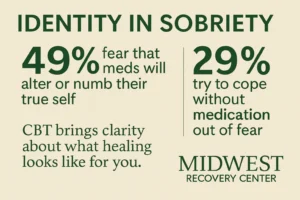When you finally hear the words—you have depression, you have anxiety, you have a mood disorder—it can feel like your whole body exhales and tenses up at the same time.
There’s relief. Something makes sense now. But then, almost always, there’s the next moment: Now what?
And for many people I work with, that next moment includes a treatment plan that recommends medication.
That’s where the fear sets in.
Not because they don’t want to feel better. But because they don’t want to lose themselves in the process. I hear it all the time:
- “What if I’m not me on meds?”
- “What if I get numb?”
- “What if I can’t be creative or emotional or present the way I used to?”
These are real fears. And they’re not silly. They deserve space.
So let me say this clearly, as a clinician who’s sat with many people in that same fear: medication isn’t the only tool in your toolbox. And even if medication becomes part of your plan, it’s not your only path to healing.
Cognitive Behavioral Therapy (CBT) is one of the most effective, empowering ways to support mental health—whether or not medication is on the table.
At Midwest Recovery Center in Toledo, we use CBT because it helps people connect to their own voice, power, and clarity—especially when they feel unsure.
If You’re Scared to Take Medication, You’re Not Alone
Medication can be life-changing. But even saying the word “medication” out loud to a provider for the first time can feel like stepping off a cliff.
The fear isn’t always about the medication itself—it’s about what it symbolizes.
You might wonder:
- Does this mean I’m broken?
- Will people treat me differently?
- What if this changes who I am at my core?
One client told me, “I’m afraid meds will take away the best parts of me—the sensitive, intuitive parts. I’ve lived with my brain this long, and yeah, it’s hard. But it’s also mine.”
If that hits close to home, CBT offers a safe starting point. It creates a space where you can explore those fears, understand where they come from, and decide what you want to do next.
CBT Helps You Understand What’s Happening Inside You
CBT isn’t a “talk until you cry” kind of therapy. It’s structured, practical, and focused on how thoughts, feelings, and behaviors connect.
That means:
- Learning to recognize unhelpful thinking patterns (like catastrophizing or self-blame)
- Understanding how those patterns influence your emotions and choices
- Gaining tools to challenge or shift those thoughts when they show up
It’s not about pretending everything is fine. It’s about building skills to navigate what’s real—without getting stuck.
You Don’t Have to Commit to Medication to Start CBT
This part is important: you can start CBT even if you’re not sure about medication. There’s no pre-requisite. No pressure. No ultimatums.
Many clients come to us unsure. That’s normal. They say:
- “I don’t want to be on meds unless I really need them.”
- “I want to see if therapy alone helps first.”
- “I’m scared of the side effects, and I just need to talk to someone.”
CBT gives you something to do while you figure it out. It’s not just passive processing—it’s active learning, experimenting, practicing. And for many people, that alone brings noticeable shifts in mood, clarity, and stability.
CBT Works With Medication, Too
If you do decide to try medication—now or later—CBT doesn’t become irrelevant. In fact, it becomes even more helpful.
That’s because medication can help ease the intensity of symptoms, while CBT helps you build the internal tools to manage them.
Think of it like this:
- Medication can turn down the volume.
- CBT teaches you what the lyrics mean—and how to respond.
One without the other can work. But together, they offer deeper, more durable healing.

What Healing Really Looks Like
Let me tell you about a client—let’s call her Sam.
She was newly diagnosed with generalized anxiety disorder. For years, she’d just called herself “high-strung.” She functioned well on the outside, but inside, everything was constantly revving.
Her doctor suggested meds, and she froze. “I’m scared I’ll stop caring,” she said. “I’m scared I’ll feel… dull.”
So we started CBT first. We worked on identifying when her thoughts spiraled. We looked at the fear behind the perfectionism. We practiced slowing things down—mentally and physically.
Three months in, she was sleeping better. Laughing more. Still anxious sometimes, but not ruled by it.
Eventually, she chose to try a low-dose medication—not out of desperation, but from a place of confidence. “I want this and my therapy,” she told me. “Because now I know I’m not giving up who I am. I’m taking care of her.”
That’s the shift CBT can support.
You Can Still Be Creative, Deep, Emotional—and Well
One of the most heartbreaking fears I hear is: “What if treatment takes away the best parts of me?”
Whether it’s creativity, emotional depth, artistic sensitivity, or spiritual connection—many people are scared that getting better will mean losing those things.
But here’s the truth: those parts of you aren’t symptoms. They’re you.
CBT doesn’t strip them away. It helps you access them with less chaos.
You don’t have to suffer to be deep. You don’t have to be in crisis to be creative. You can learn to hold your emotions without being consumed by them.
You still get to be you. CBT just helps you be you—with more space, clarity, and choice.
FAQ: CBT and Medication—What You Might Be Wondering
Do I need a diagnosis to start CBT?
No. You can begin CBT even if you’re still in the process of understanding what you’re experiencing. Many clients start therapy before they have a formal diagnosis.
Can CBT replace medication?
In some cases, yes. For mild to moderate symptoms, CBT alone may bring significant relief. For more severe symptoms, a combination of CBT and medication often works best. You and your provider will decide what fits your needs.
Will my therapist pressure me to take meds?
No. At Midwest Recovery Center, our role is to support your choices—not make them for you. If medication is recommended, we explain why, offer options, and respect your autonomy.
What if I start meds and don’t like them?
You’re not locked in. Medication can be adjusted or paused under medical guidance. CBT gives you tools to navigate these decisions with more self-awareness and support.
Is CBT available in person in Toledo, Ohio?
Yes. Our CBT program in Toledo includes in-person and, when appropriate, virtual options tailored to your schedule and needs.
You Don’t Have to Have All the Answers Today
Healing doesn’t happen in a single decision. It happens in small moments—like reading a blog post at midnight and thinking, Maybe there’s another way.
If you’re newly diagnosed and unsure about next steps, you don’t have to pick a path right away. You just have to start asking the questions.
CBT is a place to ask. To learn. To breathe.
You’re allowed to be scared. You’re allowed to be unsure. And you’re allowed to get help—even if you’re still figuring out what help looks like.
You’re not alone in this.
Call (888) 657-0858 or visit our CBT services in Toledo, Ohio to talk with someone who gets it. We’ll help you find support that fits—no pressure, no assumptions, just care. If you’re in Maumee, Perrysburg, Oregon, Ohio, or Lambertville, Michigan, Midwest Recovery provides programs with that same trusted approach.


























